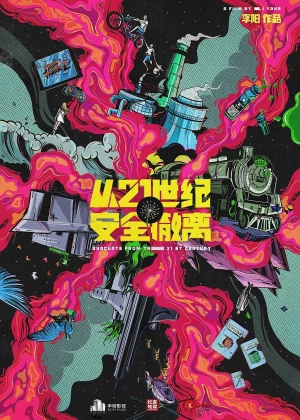Escape from the 21st Century
There's nothing better than to sit down for a film, vaguely expecting it to be interesting, only to be blown away by it. Such was my experience with Yang Li's Escape from the 21st Century [Cong 21 Shi Ji An Quan Che Li]. I hadn't studied the film in detail before deciding to watch it, I was hoping to get an above-average streamer flick, but nothing more. It turns out this is a descendant of the boundless maximalist films that surfaced around 15 years ago when Chinese cinema was trying to figure out its post-arthouse DNA. Not exactly what I expected to find.
![screencap of Escape from the 21st Century [Cong 21 Shi Ji An Quan Che Li]](/thumbs/img/articles/1200xauto/escape-21st-century-1.webp)
I should've known better. Yang Li is one of the directors behind Lee's Adventure, a unique genre and style blender that baffled audiences a decade ago. Though people love to whine about cinema's lack of originality, films brimming with creativity and an eagerness to do things differently often get dismissed quickly. The sad thing is that not much has changed in the 13 years since Lee's Adventure's release. Escape from the 21st Century is still considered too fast-paced, unfocused, and frivolous to be considered a powerhouse film. That is, by the consensus. I adored it.
Mind you, it requires some energy to get through the film. There's a myriad of genres that Li alternates between, the visual density is high and the plot bounces around in various directions. Like Lee's Adventure, Escape from the 21st Century isn't very pure or singular, it's a grotesque mix of fresh ideas, homages, and future-forward experiments. Not everything works, that would've been mental, but I have to appreciate the vigor and relentlessness that drives the film from start to finish. And to be honest, the good greatly overshadows the mediocre here, which is a small miracle.
Planet K is comparable to Earth, but days are only 12 hours long and the place has its unique history. In the year 1999, three boys set out to defend the honor of a girl. They are bested and they're thrown into the sea, and their bodies are subjected to a strange chemical that was dumped there. It gives them the ability to travel twenty years back and forth from the future whenever they sneeze. What is an exciting adventure at first quickly becomes a sobering experience, as they discover that the future isn't as promising and pleasant as they hoped it would be.
![screencap of Escape from the 21st Century [Cong 21 Shi Ji An Quan Che Li]](/thumbs/img/articles/1200xauto/escape-21st-century-2.webp)
Visually a lot is going on. The scenes set in 1999 use a more squarish aspect ratio, whereas the ones set in 2019 are ultrawide (if you hate the letterbox effect, better brace yourself). The transitions are filmed in a more traditional 16:9, but they're rare. Li also loves to play around with the editing, applies animation overlay effects, has some fun with color and lighting, and speeds up or slows down the tempo to create impact. It's a maximalist playground and Li makes excellent use of whatever trick he has in his toolbox to make it as intense as possible, but it's no doubt divisive.
The score isn't half as interesting, but that's not a big surprise. It's one of the weak spots of Chinese cinema, not even a film like this will challenge that status quo. That is to say, the score isn't terrible, it's a functional selection of tracks that help to set the mood and add the proper accents in the right places. But unlike the visuals, it doesn't challenge or innovate. The score doesn't demand attention nor has a notable impact on the film, it's just supporting background noise that checks off the bare minimum requirements. It's a little disappointing, but par for the course.
As for the performances, they are fine, though they are secondary to the presentation. It's not that the actors do a bad job, they handle the little bit of drama well and they're capable enough to wrestle themselves through the action and comedy bits, but their characters are quite generic and none of the actors are able to inject enough charm and identity to make them memorable. To be fair, they weren't helped by Li, who was too busy adding polish to other parts of the film. Not that it matters too much, this isn't a film you're watching for strong characterizations or layered drama.
![screencap of Escape from the 21st Century [Cong 21 Shi Ji An Quan Che Li]](/thumbs/img/articles/1200xauto/escape-21st-century-3.webp)
Escape from the 21st Century is a fast-paced film with an original setup, and Li loves spending time on the presentation, so you're best to pay attention during the first 15 minutes to get the general gist of things. The film remains relatively unpredictable throughout, though the second half is a little easier to keep track of. If you're only watching this for the plot then you're not going to have the best time I fear, as it's all rather haphazard and scrapped together, but that's missing the point of what Li is doing here. This is more about paying homage, remixing, and pushing the boundaries of what's already out there.
On the one hand, Escape from the 21st Century is a rather accessible film, as it offers a fun genre mashup with elements that should speak to a variety of crowds. But the maximalist styling and the breakneck pace aren't going to be for everyone. They're right up my alley though, and I wish more directors would have the creative freedom to do what Li does. The concept is cool and the pacing is mad, but it's the bonkers cinematography, the constant onslaught of new ideas, and the smart details sprinkled throughout that make this my kind of film. I hope Li's next one won't take as long to materialize.
